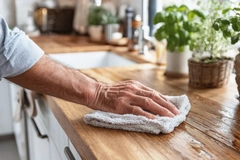Univar on the beauty–home care convergence that is redefining modern cleaning
Key takeaways
- Home care is evolving through beauty-inspired innovation, sustainability, and advanced science.
- Enzymes, microbiome-supportive formulations, and compact formats are reshaping modern cleaning.
- Cross-category influence from personal care is driving new sensorial and performance expectations.

The home care sector is entering an era where microbiome science, neurocosmetic thinking, sustainability demands, and “skinnified” innovation are reshaping how consumers clean.
Personal Care Insights speaks with Matt Anderson, global marketing manager of home care and industrial cleaning, Ingredients and Specialties, at Univar Solutions. He outlines how cross-category inspiration between home care and personal care is redefining what modern cleaning products can be.
“Companies that have traditionally created fragrances for personal care are now moving into the home care space by infusing their signature scents into cleaning products. Conversely, personal care manufacturers are entering low-barrier categories, such as premium laundry, where fragrance and sensorial experience are key differentiators.”

Anderson explains that the duality of formulation, where the functionality of home care is balanced with the skin-centric qualities of personal care, marks a strategic convergence rather than mere category expansion.
“We’re seeing more home care products launching with skin health claims, bridging the gap between cleaning and personal care.”
He expects the synergy to deepen over the next few years. “Personalization is already common in beauty and personal care, but it is becoming a major trend in home care, alongside innovations that combine efficacy with luxury and wellness.”
Low impact, high performance
A growing demand for sustainable household cleaning products is driving innovation for compact and concentrated cleaning products. In this space, enzymes are increasingly being used in home care categories due to their sustainability and cost-effective profile.
“Enzymes are a great way to reduce the carbon footprint of a cleaning solution. They allow you to wash your clothes at a lower temperature, which saves both energy usage and money for consumers,” Anderson says.
In addition to this, enzymes offer high-performance benefits, which Anderson says consumers increasingly expect out of their cleaning products.
He adds that, globally, nearly a quarter of new household cleaner launches in 2024 featured claims of long-lasting performance. He points to synbiotic formulations that are being promoted for their ability to keep surfaces clean for extended periods after application.
“For formulators ready to lead the way, cellulases can help unlock new dimensions in detergent innovation, balancing sustainability, performance, and consumer satisfaction. Brands looking to redefine ‘clean’ and deliver meaningful, science-backed performance should consider incorporating enzymes.”
Anderson cites data that shows consumers are beginning to view cleaning as a form of self-care, and enzymes play a role in this demand as well.
“The rise of influencing mood and mental well-being through cleaning, and the fragrances within cleaning products, alongside enzymes and microbes, support this. Innovations in textures and colour psychology can also help to create positive experiences for the consumer.”
.webp) Laundry detergents are increasingly blending high performance with sustainable, science-backed innovation.Another change in the home care category is consumers’ increased focus on microbiome-supportive formulations. Consumers are increasingly knowledgeable about “good” and “bad” bacteria, leading them to explore innovations that maintain good bacterial balances.
Laundry detergents are increasingly blending high performance with sustainable, science-backed innovation.Another change in the home care category is consumers’ increased focus on microbiome-supportive formulations. Consumers are increasingly knowledgeable about “good” and “bad” bacteria, leading them to explore innovations that maintain good bacterial balances.
“Consumers are becoming more aware of the difference between types of bacteria. This is driving interest in cleaning products that support or protect the home microbiome.”
Green cleaning
Sustainability is becoming an increasingly defining force in the next generation of home care solutions. In this space, IFF and BASF recently announced a collaboration to accelerate innovation in sustainable enzyme and polymer technologies for cleaning products.
Last month, at the SEPAWA Congress 2025, in Berlin, Germany, Clariant launched its TexCare One Terra, a biodegradable laundry ingredient for concentrated detergent capsules.
TexCare One Terra is energy efficient both for the end-consumer and in the manufacturing process. Its compact size allows for fewer logistics resources, and it helps consumers save water and electricity by effectively cleaning dirty laundry and stains at low washing temperatures.
Givaudan also recently expanded its home care portfolio with a biodegradable laundry serum and plans to boost production in Singapore to meet growing demand.













